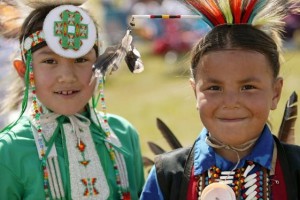Sunday
Opinion PiecesThe Plight of Canadian First Nations Children
article by Linda V. Lewis
Of 150, 000 First Nations children in Canada, more than 3,000 died in the residential school system, which ran from the 1870s until the 1990s. These shocking findings are the result of a first systematic search of government and school records, and the number is expected to rise as more documents come to light.
The leading cause of the death of so many native children was disease — especially TB — but malnutrition, fire, drowning, and suicide followed in that order. Many children were mentally, physically, and sexually abused, and then committed suicide or died of exposure in the frigid North, fleeing the schools.
Student deaths were so much a part of the residential school system that architectural plans for many schools included cemeteries laid out in advance. And at least 500 victims remain nameless because it was policy not to report their deaths. Native children were forced to attend these residential schools under the federal policy of “civilizing” aboriginals by disrupting their traditional education. This led to loss of native languages and cultural identities.
In fact, this cultural genocide was still practiced in provinces like Nova Scotia, where only 25 years ago it was illegal even for adult Mi’kmaq natives to gather together in a drum circle.
Today systematic under-funding (22% less) of child-welfare services on First Nations reserves means that Canadian aboriginals are re-living the residential school nightmare. Because many reserves don’t have the resources to keep children safe when their families are struggling, the children are taken away and sent into institutional care by the thousands. This is what Shawn Atleo of the Assembly of First Nations told the Canadian Human Rights Tribunal in late February, 2013. So it is now poverty that is divorcing native children from their families and cultural communities.
Both the Crown and the Conservative government continue to disregard the treaties and constitutional rights of the First Nations. No meaningful dialogue has happened between Harper’s government and the elected Aboriginal leadership.
But Tom Mulcair of the New Democrat Party urges Prime Minister Harper to make good on the promises his government made to aboriginal leaders in January 2012; it was then that Harper voiced a commitment to do better by working in partnership with First Nations. # Furthermore the government issued a Statement of Apology back in 2008, which was delivered by PM Harper, in which he said, “There is no place in Canada for the attitudes that inspired the Indian Residential Schools system to ever prevail again.”
Yet Harper’s government, without consultation and without respecting signed treaties, continues to force legislation (esp. Bill C-45) upon First Nations, Inuit and Metis.
Thus the current Idle No More grassroots movement is an important vehicle to influence not only positive action re: sustainable environment, but also the rights of Canada’s indigenous people and their children, holding Harper to his promises. It is my personal aspiration that Canadian Shambhalians spread the light of awareness on this issue and perhaps also take a further step by writing to their MPs.
# Read more by clicking here.






Mar 31, 2013
Reply
Thank you for this article Linda. It is an important message.
xo, Terry Rudderham
Mar 31, 2013
Reply
What up, Steve?
http://www.youtube.com/watch?v=rz0GDSrkw-Q&sns=em